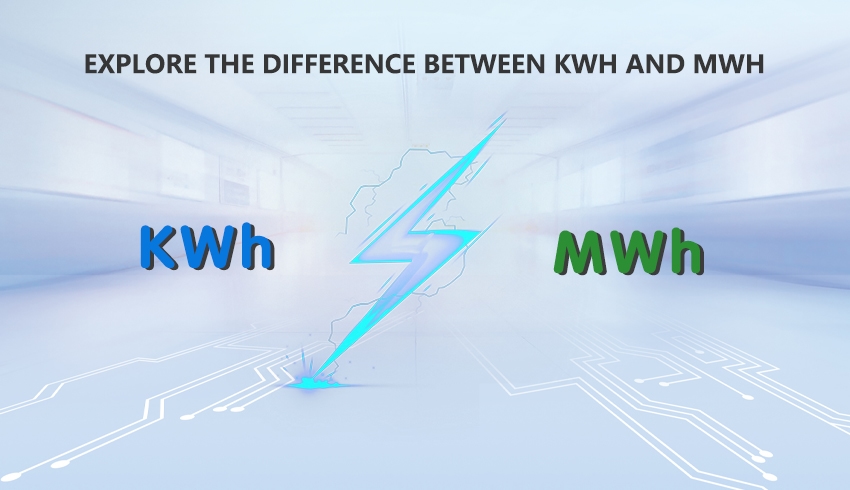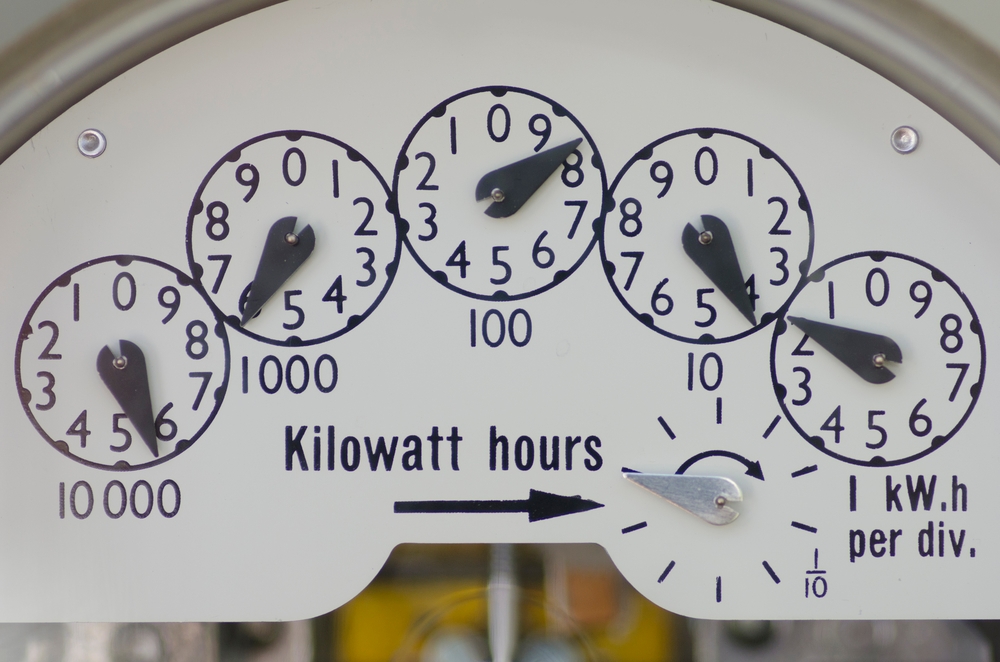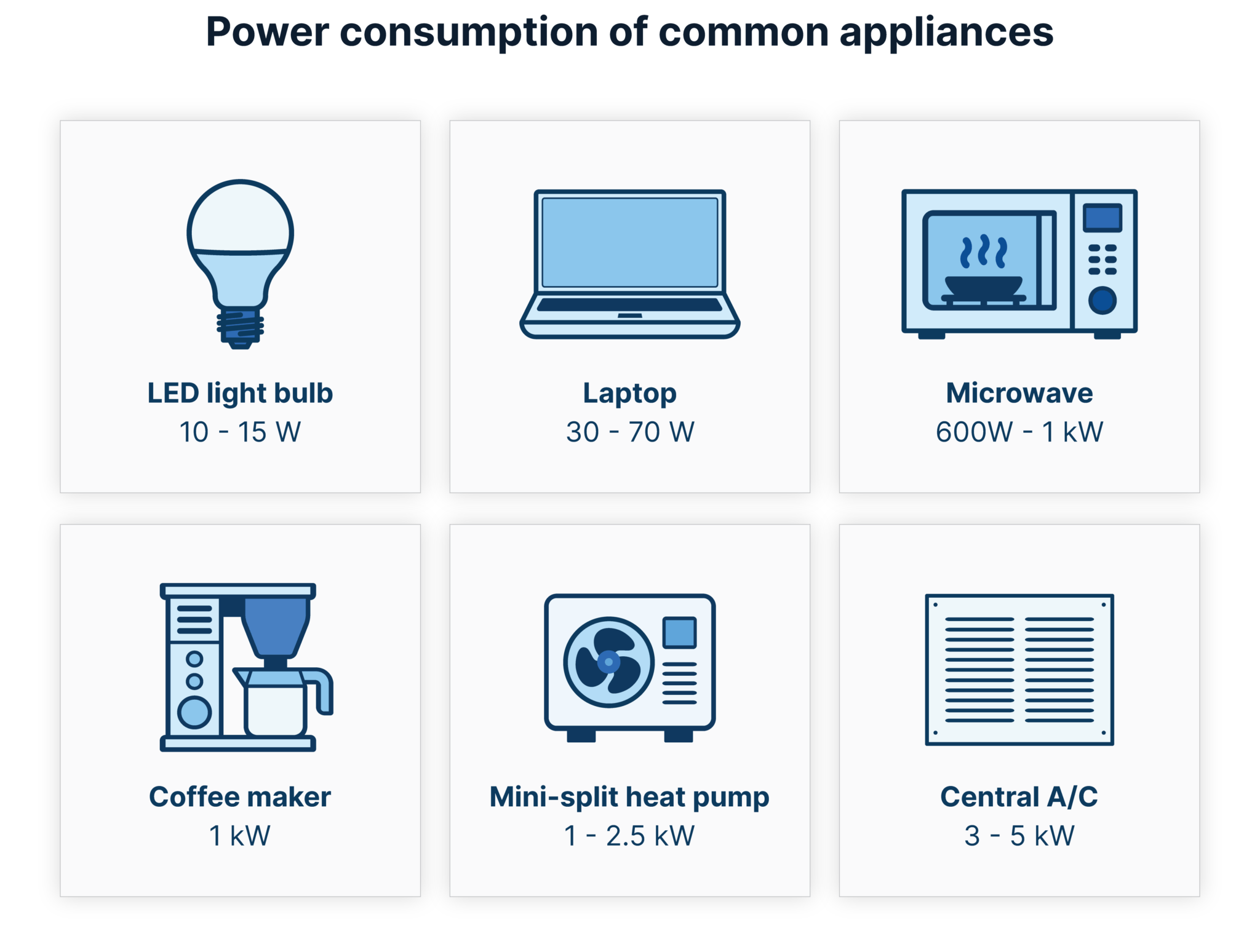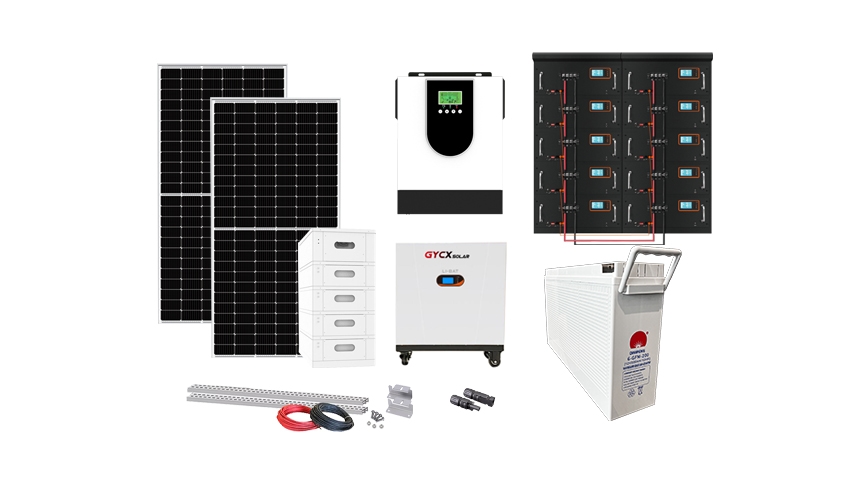Om du har funderat på energikostnader på sistone, Du kanske vill överväga att uppgradera ditt hem energieffektivitet, som att installera solpaneler. Vid jämförelse av energiplanpriserna, Du kommer ofta att höra kWh och MWH -mätvärden. Så vad betyder KWH egentligen? Hur skiljer det sig från kilowatt (KW) och megawattimmar (MWh)?

Övergripande, Denna artikel belyser vikten av dessa enheter inom solindustrin och vikten av att förstå deras omvandling för effektiv systemdesign och drift.
Beskriv kort KWH och MWH
Konverteringsprocessen mellan KWH och MWH är faktiskt ganska lätt. I gemensam, 1 megawattim (MWh) av energi motsvarar 1,000 kilowattimmar (KWh).
När vi inte förstår syftet med kraftenheten, Dessa saker kommer att känna sig komplicerade. dock, När vi vet vad varje enhet är för och hur man kan härleda den, det blir väldigt enkelt att konvertera en enhet till en annan.

Kilowattimmar (KWh) används för att mäta mängden energi som konsumeras eller produceras under en tidsperiod, Medan kilowatt (KW) används för att mäta hastigheten för energiöverföring. Megawatt (MW) används för att mäta större mängder kraft och används vanligtvis i industriella miljöer.
Förstå kilowattimmar
Kilowatt (kW) är ett mått på mängden energi som används eller produceras av en utrustning vid en viss tidpunkt. Kilowattimmar (kWh) representera mängden av denna energi som ackumuleras över tiden.
Till exempel, en brödrost kan ha en högre effektgradering än ett kylskåp, Men kylskåpet går hela dagen och kräver fler kilowattimmar för att upprätthålla kraft. Så med en KW till KWH -kalkylator tittar du på mängden energi som används under en tidsperiod.

KWH är relaterad till tiden. När vi använder energiformeln för att beräkna kilowattimmen till en apparat eller hem. Formeln är energi är lika med krafttider. Med en förståelse för kilowattimmar, Beräkning av solbehov med en kilowatt-timme kostnadskalkylator eller storlekssystem är mindre komplicerat.
Förklaring av kilowatt och watt (Kw och w)
Du kommer ofta att se en kilowatt eller watt -betyg på förpackningen av en apparat, som beskriver den kraft som krävs för att använda apparaten.
Om vi bara vill använda kilowatt som en mätenhet för beräkningar, Men apparater är i watt, Vi kan utföra några enkla kilowatt-till-watts konverteringar.

Megawatt timme (MWh) och megawatt (MW) tolkning (MWH vs MW)
Nästa enhet Kilowatt är Megawatt, Och en megawatt timme är en megawatt av el som varar i en timme. En megawatt är lika med 1,000 kilowatt eller 1 miljoner watt, vilket är mängden kraft som vanligtvis används i industriell el.
Samma konvertering gäller för megawattimmar och kilowattimmar. Så, om a 1,000 watt (1 kW) Mikrovågsugn går kontinuerligt för 41.6 dagar, det kommer att konsumera 1 megawattim (MWh) av energi (1,000 watt / 24 timmar per dag = 41.6 dagar).
Varje jämförelse mellan kilowatt och kilowattimmar kan tillämpas på megawatt och megawattimmar, endast 1,000 tidig. 1 MWH av energi motsvarar 1,000 KWH av energi. I en solenergiinstallation, Du kommer troligen att behöva batterier för att lagra energi, Så både megawatt och megawattimmar används för att beskriva batterikapaciteten för en stor solenergi-systemsvit.
Hur man förstår energianvändning och kilowattimmar
Att förstå sammanhanget för de relevanta indikatorerna är viktigt för att förstå KWH och MWH. Till exempel, det genomsnittliga amerikanska hushållet använder 10,972 KWh energi per år (Enligt USA. Administration av energiinformation), som kan uppskattas till cirka 914 kWh per månad, eller knappt 30 kWh per dag.
I bostadsenergianvändning, Den vanligaste enheten är KWH. Vid utvärdering av energiuppgraderingar, Företag diskuterar hur många kilowatt systemet behöver för att möta kilowattimmen efterfrågan. Däremot, MWH hänvisar vanligtvis till större elanvändning, såsom nya kraftverk eller energiuppgraderingar i städer. I storskaliga energianvändningsscenarier, Den föredragna termen är megawatt-timme eller Gigawatt timme (GWh), som hänvisar till en miljard watt el.
Varför är den medelstora kilowattimmen av solenergi viktigt
När du tittar på solalternativ, Du måste avgöra om det köpta systemet kan möta energibehovet, Där kilowatt och kilowattimmar spelar in, Kombinerat med datapunkten "solpanelproduktivitet", Du kan exakt känna till systemstorleken.
När det gäller solenergi, konvertera kraftkapaciteten (watt) till den förväntade energiproduktionen (KWH) är inte lätt på grund av olika faktorer. Det som är säkert är att el genereras med en konstant hastighet var den än är, och utgången för solpaneler påverkas avsevärt av miljön och omständigheterna.
Solenergiomvandling kilowattimma formel
Solpanelproduktivitet (även känd som solprestandaförhållande) är en faktor som avgör om ditt tak och plats är lämpligt för solinstallation, så att du exakt kan bestämma storleken på ditt solsystem. Faktorer som takets vinkel och orientering och antalet timmar med solljus i din stad eller stat kommer att påverka solpanelernas prestanda avsevärt.

Solpanelproduktivitet är en metrisk som gör att du kan uppskatta storleken på ditt solsystem som krävs och antalet timmars el du förväntar dig att generera. Till exempel, Solpaneler på norra sidan av taket kommer att vara mycket mindre produktiva än samma paneler på södra sidan av taket, Eftersom söderläge tak vanligtvis får mer exponering för solljus. KWH -formeln för konvertering är som följer:
Solar Array System Size (kW) = årlig energibehov (kWh)/solpanelproduktivitet
Så, Om ditt hem använder 10,972 KWH per år (det nationella genomsnittet) och din plats och taktyp har en solproduktivitet av 1.57, Du kommer att behöva om 7 KW av solenergisystem för att kompensera dina energibehov.
Börja din solresa på GYCX Solar
Om du vill ha en anpassad systemdesign för ditt hem, Det bästa sättet att få mer information är genom en ansedd solinstallatör. De kan hjälpa dig att uppskatta ditt hems solpotential, hur mycket energi ett solpanelsystem kan generera i ditt hem, Och hur mycket det kommer att kosta.
Om du vill få en offert från en vetted solinstallatör i ditt område, Kolla in vår marknad för Gycx solpaneler.
Slutsats
När du konverterar en kraftenhet till en annan, för det mesta behöver du lita på lagar eller beräkningar.
Men när det gäller KW till MW eller KWH till MWH, bara multiplicera eller dela med 1,000 För att få de enheter du vill ha.
